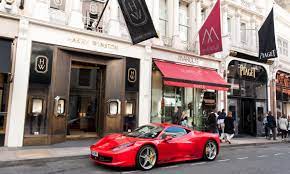2% tax on UK rich list families ‘could raise £22bn a year’

London: A modest wealth tax on the richest 350 families in the UK could raise more than £20bn a year – enough to fund the construction of 145,000 new affordable homes a year – according to research by fairer taxation campaigners.
A 2% tax on assets above £10m held by all members of the Sunday Times rich list could raise as much as £22bn, according to analysis by Tax Justice UK, the Economic Change Unit and the New Economics Foundation (NEF).
The campaigners said similar wealth taxes in Norway, Spain and Switzerland had helped to reduce inequality and eased the cost of living crisis for some of the poorest people in those countries. They called on the government to carry out urgent reform of the “fundamental unfairness in the tax system which means that income from work is taxed more than income from investments, rent and inheritances”.
Lukasz Krebel, economist at NEF thinktank, said: “This year’s rich list shows that at a time when so many of us are struggling with the cost of living, the very wealthiest in society continue to thrive.
“Yet this elite group aren’t taxed as much as those of us who earn our living, leaving us with less money to invest in hospitals, schools and parks. We can share the wealth that we all create by increasing taxes on the very rich. By doing this, we can repair our public services, power our future with locally made energy from the wind and sun, and create jobs and thriving neighbourhoods for all of our families.”
The richest 250 families in the UK are sitting on combined wealth of £748bn, according to the annual Sunday Times rich list published last week, an increase from £704bn the previous year.
Those on the rich list include the prime minister Rishi Sunak and wife Akshata Murty at number 275 out of 350, with £529m, and the 32-year-old Duke of Westminster, with £9.9bn, at number 11.
The campaigners pointed out that less than a quarter of the 100 wealthiest people on the Sunday Times rich list appear in the same publication’s annual tax list celebrating those who pay the most tax.
“Because assets are generally taxed at a lower rate than income, many of the wealthiest people in the UK are likely to be paying a relatively low tax rate,” the campaigners said. “However, it should be noted that some on the list with ‘non-domicile’ status or who are fully based offshore for tax purposes may not be paying UK tax on all earnings.”
Robert Palmer, executive director of Tax Justice UK, said: “The growing wealth of those on the rich list highlights the inequality in our tax system, where those who are already wealthy from investments, rent and inheritances are taxed relatively lightly compared to those who get their income from work. It can’t be right that many working people are paying a higher effective tax rate than some of the very wealthiest in our society, especially when we are seeing falling living standards and increasing bills for the majority.
“The government must urgently bring forward reforms to fix our broken tax system, bringing in higher taxes on wealth, so that those who earn the most, and own the most, pay their proper share.”
Privacy Notice: Newsletters may contain info about charities, online ads, and content funded by outside parties. For more information see our Privacy Policy. We use Google reCaptcha to protect our website and the Google Privacy Policy and Terms of Service apply.
The number of UK billionaires has increased sharply since the pandemic, from 147 in 2020 to 171 this year, with billionaires now holding about £4bn on average each. There were 15 UK billionaires when the Sunday Times first published its rich list in 1990.
In 2021, the independent Wealth Tax Commission recommended that the government introduced a one-off 1% wealth tax on households with more than £1m, which they said would generate £260bn, more than enough to cover a year’s funding of the NHS and social care spending.
A Treasury spokesperson said: “The UK’s taxes on wealth are on par with other G7 countries and our progressive system means that the top 5% of income tax payers pay half of all income tax, with millions lifted out of paying it altogether.
“We have already built more than half a million affordable homes since 2010 and our £11.5bn affordable homes programme will deliver thousands more right across the country.”





